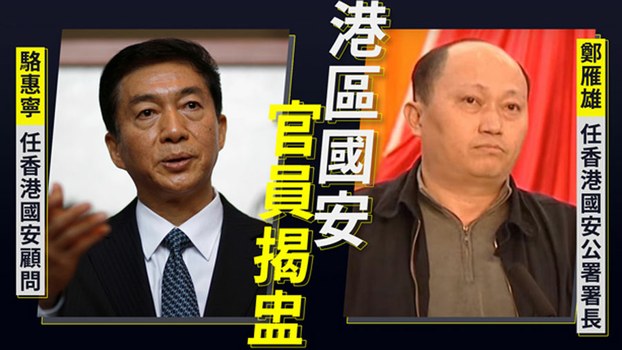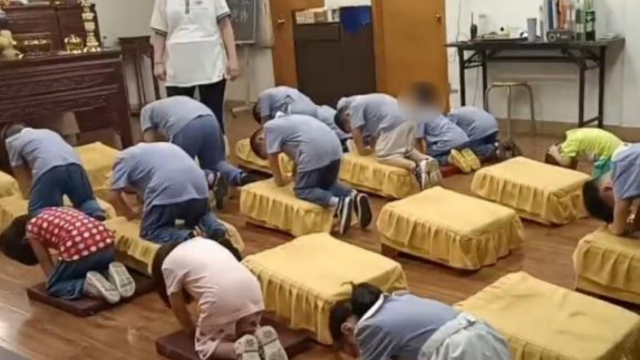
The ruling Chinese Communist Party on Friday appointed a former mayor who cracked down on the rebel village of Wukan to head its national security office in Hong Kong.
China’s cabinet, the State Council appointed Zheng Yanxiong, former mayor and Communist Party secretary of Guangdong’s Shanwei city at the time of the Wukan protests, head of its Hong Kong-based national security office.
Luo Huining, who heads Beijing’s Central Liaison Office in Hong Kong, was also made National Security Adviser to the committee set up to oversee the implementation of a security law banning subversive and secessionist words and deeds, as well as collusion with overseas forces and acts deemed to be terrorism.
Under new powers given to her under the new law, Hong Kong chief executive Carrie Lam has also picked six judges to hear cases under the new law, a move that drew an unprecedented comment from Chief Justice Geoffrey Ma, who said judges should only be appointed on the basis of judicial and professional qualities, and not politics.
The office in charge of implementing the law won’t be subject to Hong Kong law, but to that of mainland China, and will be able to handle certain cases directly if it sees fit. Suspects in such cases could also be extradited to face trial in a mainland Chinese court.
The Hong Kong government confirmed on Thursday that speech will also come within the remit of the law, including protest slogans from the pro-democracy movement that began as protests against extradition to mainland China, and which has rocked the city for the past year.
The announcement came after police said they had made 10 arrests under the new law after thousands came out onto the city’s streets as the law took effect on July 1, the anniversary of the 1997 handover to Chinese rule.
Hong Kong current affairs commentator Liu Ruishao said Luo’s “advisor” role would be far more than that in practice.
“His powers include the authority to give advice, which, in the political context of the Chinese Communist Party, means issuing instructions and orders that must be heeded,” Liu told RFA.
“He is [effectively] playing the role of Communist Party secretary [to the Hong Kong government], so we can see now that there is no more separation between the two systems,” he said.
‘Mainland-style governance’
Bruce Lui, senior journalism lecturer at Hong Kong’s Baptist University, said those sent to impose the will of the ruling Chinese Communist Party were all known for their toughness.
“I don’t think there will be any tolerance of street protest, and the room allowed for freedom of expression has shrunk a good deal now,” Lui said.
“This is mainland-style governance, the natural consequences of which will be brainwashing and crackdowns,” he said.
While serving as party secretary of Shanwei in 2011, Zheng styled the Wukan protests, which were sparked by rampant official corruption and loss of farmland, as being whipped up by Hong Kong media and “foreign forces.”
He became known for saying: “The day you can trust the foreign press, pigs will climb trees.”
Zheng also served as vice minister of the Guangdong provincial propaganda department in 2013, a few months after a rare public protest over press freedom in support of a strike by journalists at the Southern Media Group.
Li Jiangzhou, who will be deputy director of the Hong Kong national security office, has a background in internal affairs and already serves as Beijing’s liaison to the Hong Kong Police Force.
23-year-old charged with terrorism and secession
Little is known about fellow deputy director Sun Qingye beyond media rumors that they come from a national security background. The official Global Times newspaper said it was unable even to confirm Sun‘s gender.
Veteran Hong Kong policewoman Edwina Lau will head the force’s own national security department, which will be tasked with bringing cases under the law that aren’t directly handled by Beijing.
Hong Kong police on Friday charged a 23-year-old man with terrorism and secession, the first prosecution under the national security law for Hong Kong.
Tong Ying-kit was accused of crashing a motorcycle into a group of police officers in Wanchai during protests on July 1, although social media footage at the time appeared to show a rider grabbed by around a dozen officers, who dragged him from the bike.
Tong is accused of carrying a flag bearing the words: “Free Hong Kong. Revolution Now!” a slogan the government said is banned under the new law.
He is charged with inciting others to organize, plan, commit, or participate in acts “with a view to committing secession or undermining national unification,” or separating Hong Kong from China, or “altering by unlawful means the legal status” of Hong Kong. He also faces a charge of “engaging in terrorist activities.”
Former Hong Kong politician and youth leader Nathan Law, who was among six pro-democracy lawmakers stripped of their seats in Hong Kong’s Legislative Council (LegCo) following a decree from Beijing about the validity of their oaths of allegiance, said via Twitter that he has already left Hong Kong.
“So I bade my city farewell,” Law wrote from an undisclosed location. “As the plane took off the runway, I gazed down at the skyline I love so much for one last time. Should I have the fortune to ever return, I hope to still remain as I am: the same young man with these same beliefs. Glory to Hong Kong.”
Law said he left because several provisions in the new security law targeted activities he had been carrying out “for years,” and he wants to continue to lobby for Hong Kong on the international stage.
“As a global-facing activist, the choices I have are stark: to stay silent from now on, or to keep engaging in private diplomacy so I can warn the world of the threat of Chinese authoritarian expansion,” he said.
“The July 1 crowds show once again that the fire of Hong Kongers’ determination will not be easily extinguished,” Law wrote. “We must sustain our resistance on all fronts.”
Reported by Lau Siu-fung and Tseng Yat-yiu for RFA’s Cantonese and Mandarin Services. Translated and edited by Luisetta Mudie.
Source: Copyright © 1998-2016, RFA. Used with the permission of Radio Free Asia, 2025 M St. NW, Suite 300, Washington DC 20036. https://www.rfa.org.












